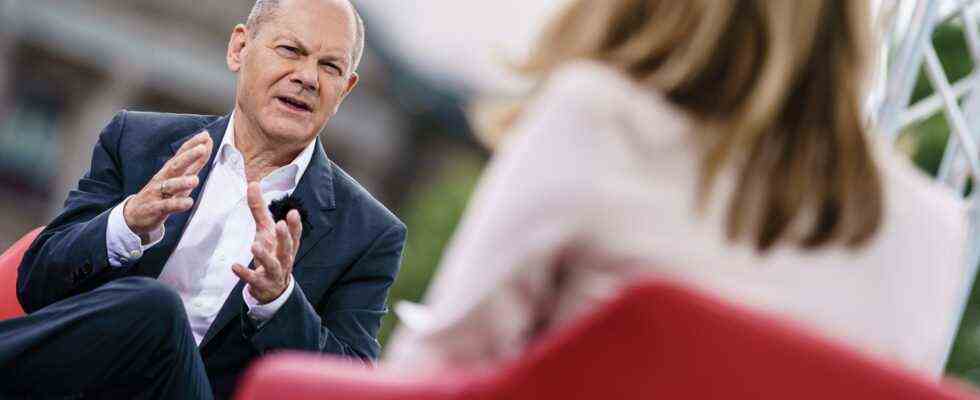analysis
Status: 08/15/2021 10:12 p.m.
With good personal poll numbers, SPD leader Scholz comes closer to the Chancellery. in the ARD summer interview he distributed against the CDU and FDP. He didn’t want to know anything about his own mistakes – he let accusations rebound.
Like a beaming schoolboy who has done his homework right, SPD leader Olaf Scholz sits in the ARD summer interview: His personal polls are good, even his unloved party was able to gain, no major mishaps so far. And only one day before he was able to celebrate the official start of the election campaign in Bochum – with slogans for a minimum wage of twelve euros. Social slogans for a social party.
Scholz promises a collective agreement
in the Summer interview if the promises meet reality: Jeannette Paach just feels that this SPD and Scholz do not respect her because she has been driving German members of the Bundestag through Berlin for four years without a tariff – day and night. The Social Democrats too. She has already been on strike, but it has brought little.
ARD summer interview with SPD chancellor candidate Olaf Scholz
ARD summer interview, August 15, 2021
She is employed by the Bundeswehr Fuhrpark GmbH – a structure that 75 percent belongs to the Ministry of Defense and 25 percent to Deutsche Bahn. But even if that sounds like state-owned companies, it gets less than the drivers who are directly employed by the Bundestag.
Does that have anything to do with respect? Chancellor candidate Scholz reacts the way he usually reacts to fate. Cool, trying to find a solution and promising her a collective agreement. Simply that way. “I will do what I can about the government,” he says. A promise that many Bundestag drivers will remind him of.
Swipe at Laschet
And also to the many other promises he is now making: He can protect the climate better than CDU competitor Armin Laschet, he says. He has a plan, Laschet doesn’t. Scholz becomes aggressive. Laschet said that the expansion of the power grid would just happen. “Nothing comes up by itself and that is bad news for all the companies,” says Scholz.
He clearly distinguishes himself from the CDU – also when it comes to taxes. The tax concepts of the FDP and CDU are idiosyncratic. 100 billion were pumped into the economy to get these companies through this time, complains Scholz. That is why he does not want to give companies that make such high profits tax breaks. But it is also clear that he and the SPD will not make it without the votes of business. But how to do that – no answer.
Nobody steps out of line
Errors bounce off him: G20, Cum-Ex, Wirecard – in whatever context he is addressed, he explains mantra-wise why he found a solution to this problem and was not to blame, or simply didn’t know anything about it. In the Wirecard case, the cool finance minister does not want to react to the fate of the angry investor Martina Wittkämper. She lost an inheritance of 30,000 euros because of Wirecard. She does not feel protected by the financial supervision, by Scholz, by the state. She asks him why he hasn’t resigned.
On the word resignation – no answer from Scholz. And even after asking three times whether he would at least like to apologize, he does not respond. Instead, he enumerates what he has always said: BaFin has been reformed and better controls have been put in place. Homework done, hooked it. Do not go into individual fates.
Few emotions have been held against him in the election campaign for months. He always replies that he is not a ringmaster. No that’s not him. But he has his SPD under control, like a director. Nobody steps out of line so that the results will be even better by the time the election takes place.
Scholz does not want to commit himself
Attacks by Laschet that the SPD-led foreign ministry had checked back and forth for too long during the evacuation from Afghanistan, Scholz vehemently rejects. “I think that on such a serious matter, you shouldn’t go around making very unsubstantiated claims,” he countered. “You should just make sure that we as a country do our job here.”
Scholz distinguishes himself from the Greens, agreeing quotas for refugees with other EU countries, not waiting for Brussels. Scholz is European and wants a common stance with the EU, NATO and allies. First of all, he wants to make protection possible where the refugees have found protection. So outside of Germany. A “We can do it” like Chancellor Angela Merkel’s back then during the refugee crisis in 2015 is not in sight. Not yet.
For that he would have to commit himself. And he doesn’t really want that at the moment – whether in coalitions or food. Even with the question “Currywurst, Labskaus or Jägerschnitzel?” he thinks everything is good. Somehow.
Do you have any questions or suggestions? Write to: [email protected]

